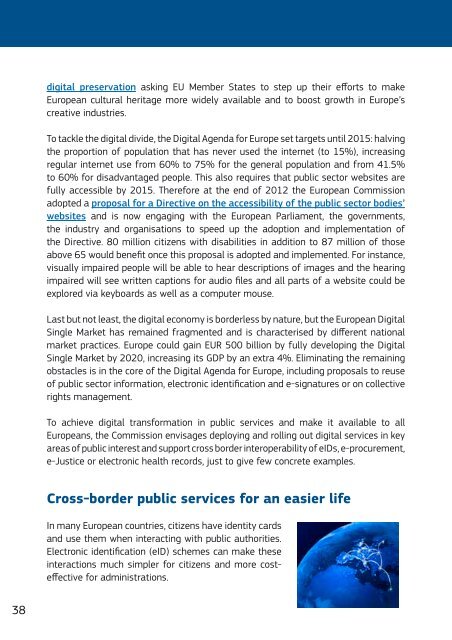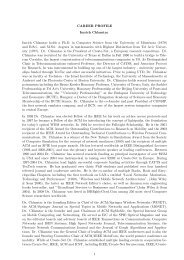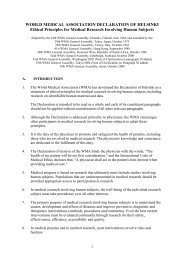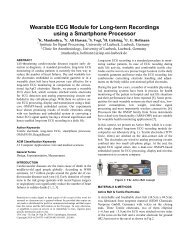ICT for Societal Challenges - European Commission - Europa
ICT for Societal Challenges - European Commission - Europa
ICT for Societal Challenges - European Commission - Europa
Create successful ePaper yourself
Turn your PDF publications into a flip-book with our unique Google optimized e-Paper software.
digital preservation asking EU Member States to step up their ef<strong>for</strong>ts to make<br />
<strong>European</strong> cultural heritage more widely available and to boost growth in Europe’s<br />
creative industries.<br />
To tackle the digital divide, the Digital Agenda <strong>for</strong> Europe set targets until 2015: halving<br />
the proportion of population that has never used the internet (to 15%), increasing<br />
regular internet use from 60% to 75% <strong>for</strong> the general population and from 41.5%<br />
to 60% <strong>for</strong> disadvantaged people. This also requires that public sector websites are<br />
fully accessible by 2015. There<strong>for</strong>e at the end of 2012 the <strong>European</strong> <strong>Commission</strong><br />
adopted a proposal <strong>for</strong> a Directive on the accessibility of the public sector bodies’<br />
websites and is now engaging with the <strong>European</strong> Parliament, the governments,<br />
the industry and organisations to speed up the adoption and implementation of<br />
the Directive. 80 million citizens with disabilities in addition to 87 million of those<br />
above 65 would benefit once this proposal is adopted and implemented. For instance,<br />
visually impaired people will be able to hear descriptions of images and the hearing<br />
impaired will see written captions <strong>for</strong> audio files and all parts of a website could be<br />
explored via keyboards as well as a computer mouse.<br />
Last but not least, the digital economy is borderless by nature, but the <strong>European</strong> Digital<br />
Single Market has remained fragmented and is characterised by different national<br />
market practices. Europe could gain EUR 500 billion by fully developing the Digital<br />
Single Market by 2020, increasing its GDP by an extra 4%. Eliminating the remaining<br />
obstacles is in the core of the Digital Agenda <strong>for</strong> Europe, including proposals to reuse<br />
of public sector in<strong>for</strong>mation, electronic identification and e-signatures or on collective<br />
rights management.<br />
To achieve digital trans<strong>for</strong>mation in public services and make it available to all<br />
<strong>European</strong>s, the <strong>Commission</strong> envisages deploying and rolling out digital services in key<br />
areas of public interest and support cross border interoperability of eIDs, e-procurement,<br />
e-Justice or electronic health records, just to give few concrete examples.<br />
Cross-border public services <strong>for</strong> an easier life<br />
In many <strong>European</strong> countries, citizens have identity cards<br />
and use them when interacting with public authorities.<br />
Electronic identification (eID) schemes can make these<br />
interactions much simpler <strong>for</strong> citizens and more costeffective<br />
<strong>for</strong> administrations.<br />
38






